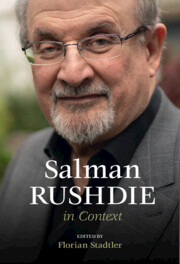Book contents
- Salman Rushdie in Context
- Salman Rushdie in Context
- Copyright page
- Dedication
- Contents
- Contributors
- Acknowledgements
- Introduction
- Part I Life
- Chapter 1 Salman Rushdie, Biography, and Autobiography
- Chapter 2 Salman Rushdie and the Fatwa
- Chapter 3 Archival Rushdie
- Chapter 4 Salman Rushdie as Public Intellectual
- Part II Literary and Creative Contexts
- Part III Historical and Cultural Contexts
- Part IV Critical Theoretical Contexts
- Part V Reception, Criticism, and Adaptation
- Works by Salman Rushdie
- Select Bibliography
- Index
Chapter 3 - Archival Rushdie
from Part I - Life
Published online by Cambridge University Press: 23 March 2023
- Salman Rushdie in Context
- Salman Rushdie in Context
- Copyright page
- Dedication
- Contents
- Contributors
- Acknowledgements
- Introduction
- Part I Life
- Chapter 1 Salman Rushdie, Biography, and Autobiography
- Chapter 2 Salman Rushdie and the Fatwa
- Chapter 3 Archival Rushdie
- Chapter 4 Salman Rushdie as Public Intellectual
- Part II Literary and Creative Contexts
- Part III Historical and Cultural Contexts
- Part IV Critical Theoretical Contexts
- Part V Reception, Criticism, and Adaptation
- Works by Salman Rushdie
- Select Bibliography
- Index
Summary
This chapter engages with new ways in which Salman Rushdie’s works can be re-contextualized through his archival papers, deposited in the Robert W. Woodruff Library at Emory University, Atlanta. A mixed archive – part physical, containing some 215 boxes of material, and part digital, with Rushdie’s hard drives and computers and emulated environments in which these can be searched – the Rushdie archive reveals new contextual frames of reference through which to read Rushdie’s work and the author’s own public identity. This chapter considers the ways in which researchers who have engaged previously in textual criticism of Rushdie need to reconfigure the writer’s oeuvre through unpublished materials, including novels and drafts, and consider the repository as a source that enables the tracing of the genesis of his works in both digital and non-digital formats.
- Type
- Chapter
- Information
- Salman Rushdie in Context , pp. 39 - 51Publisher: Cambridge University PressPrint publication year: 2023

